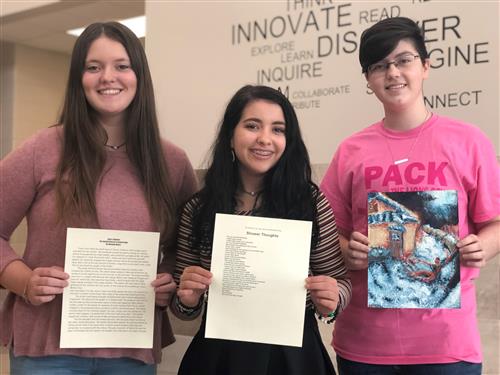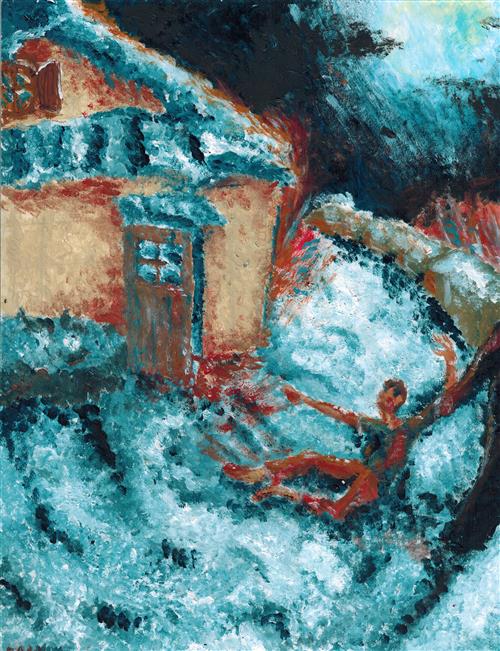‘Every Child Has a Name’

Greenville High School sophomores Miranda Hines, left, Lizzi Doty, and Ashton Brown, right, paid tribute to children killed in the Holocaust. They are enrolled in GHS's Early College High School program.
Dallas Holocaust and Human Rights Museum displays Early College High School students’ tributes to children who died
Putting yourself in someone else’s shoes isn’t easy, especially if they are the shoes of a child who died in the Holocaust.
But that’s exactly what three Greenville High School students did, and their heartfelt tributes are now on display in a special exhibit entitled "Every Child Has a Name" at the Dallas Holocaust and Human Rights Museum.
Secondary English Language Arts and Social Studies Strategist Jenny Martin was the teacher in charge of the project.
“I really saw a profound side of our students through their tributes,” Martin said. “They knew very little about the Holocaust starting out. After we went to the museum in Dallas, they dove into their research. Not only did I see their research skills grow; I also saw their hearts for others and saw them reflecting in a deep way.”
The students, all sophomores in the Early College High School program, researched the short lives of three children who were killed in the Holocaust, and they created poems, a painting and a piece of prose in tribute to them. Here are their stories in their own words:
Ashton Brown: I picked a child named Asher who was taken from home. I imagined what it must have been like to have someone drag you from your house, which is what I depicted in my poem and painting. It really made me think about my life and all the good things I have and not to ever take them for granted.

The Last Whispers Lost in Screams
That night the stars did not shine.
As the smoke blocked out the blank night sky
Dragged by the bloodstained hands
I screamed, for I knew I would not see her again.
The moon's harsh light cut across the crimson stains
Leaking from the place I called home.
The smoke covered the burning of the moon
Covering the harsh light.
But now the light burned
The last whispers lost in screams.
--------------------------------------------------------------------------------------------------------------------------
Lizzi Doty: “I chose a child named Lila who was all by herself from the time she arrived at the camp at age 2 because her parents were killed. I thought about what life must have been like for her, and how she must have wondered why people never came back from the showers. I called my tribute “Shower Thoughts.”
Shower Thoughts
For my seventh birthday,
I didn’t get a party,
I didn’t get a cake, nor a present.
For my seventh birthday,
My present was getting to turn seven.
Every day, I woke
Not knowing if I was going to see another day.
One cold Polish morning,
I was taken to the Shoah.
It was dirty there.
It was only me and Matka.
When we got there,
They split me and Matka.
I remember them saying
That she just needed to shower.
I never saw her after that.
I didn’t make many friends,
And it felt like any friend I made
Took a shower and never came back.
The day it was my turn to take a shower,
I knew why my Matka never came back.
I finally understood why my friends never returned.
Because it wasn’t water we were bathing in.
Looking death right in the face,
Surrounded by strange men and women,
I thought about my eighth birthday.
There would be no parties,
No cakes,
No presents,
Not even the age of eight
--------------------------------------------------------------------------------------------------------------------------
Miranda Hines: I chose a girl named Bela who died at two. She lived in the ghetto – I think it was in Poland. When I imagined what her life must have been like, I thought about what brought her comfort, and that’s why I wrote about Bela’s Blanket.
Bela’s Blanket
Faint cries filled the small town of Tuczyn, Poland in 1942 as Bela Agres searched for her mother. She wandered around the ghetto looking for minutes before being spotted by a Nazi soldier, who picked her up haphazardly. He yelled for someone to “claim the barren child”, being even more hostile as seconds passed. He eventually dropped the fragile two year old on the ground and walked away. Bela cried as the sky started to darken, a sign that no one would come, a sign that no one should be caught in the street.
The young child forced her way up and walked towards a nearby room occupied by a family of nine. The oldest woman walked to Bela and picked her up, seeing as no one would be out to retrieve her at the late hour. The woman laid Bela down next to a small child who was fast asleep. Bela’s cries calmed as fatigue over took her small body. Not even four hours later a shrill scream filled the small room, waking everyone from a deep slumber. The woman, who had taken in Bela, gathered all the children into the corner of the room as the screams got closer.
Before they had even made it to the corner a Nazi forcefully opened the door. He ordered for everyone to gather in the street. Bela clung to the woman who looked petrified.
The street overflowed as people stumbled from their rooms confused and frightened. The Nazis led the people to a bloodied wall. The people at the front of the line wept as they became more aware of what was happening. Bela, being a toddler, looked to the woman for answers. As loud crackles filled the air, people dropped to the ground and were carried to a ditch a few blocks away. The woman crouched down to the children’s height. In a low, cracky voice she whispered, “No matter what happens, I promise that in the end it will all be okay.” The mother hugged her children, then turned to Bela and placed a small kiss on her cheek.
The line dwindled until the woman was next. She was gone almost as fast as she came, leaving Bela alone. The soldier placed Bela against the wall and backed up taking one last look at the small child. A soldier picked up Bela’s limp body and carried her to be placed with the others. The only trace left of Bela’s life was the small, frill blanket she left behind, the blanket that indicated a life taken too soon.
We will be honoring these incredible Early College High School Students at the Oct. 15 School Board meeting.

